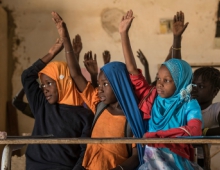Vusi Mchunu
Mazisi Kunene believes that through performance and celebration, we rediscover the splendour, the grandeur in ourselves. Central to all these elements of orature is performance. Story, riddle, proverb and dance constitute a performance genre.
The carnival takes place in the streets. Dance is a celebration of form over fixity, a momentary triumph over gravitational pull, a symbolic conquest of gravity. In the vein of Afro-Brazilian capoeira, it becomes an anti-oppression martial art-cum-dance sequence. Motion is inherent in change, growth and development in nature and nurture. Orature is a living tradition precisely because orality, its base, is always at the cutting edge of the new and the experimental.
Mphahlele, Kunene, wa Thiongo, Masilela, Nyembezi
Orality is a central technique for orature. Orature is a systematic recording and transmission of systems of knowledge via oral means. It is the primary means of managing indigenous knowledge and has many branches: literature, art, medicine, philosophy, child-rearing practices and methodologies of social cohesion.
E’skia Mphahlele (Voices in the Whirlwind: 1967) notes: “The praise poem and the epic events and deeds of a heroic nature, are ancient forms of oral poetry. When African pre-industrial communities recited praise poetry and folk tales, sang ballads, dramatised healing processes, ancestral worship, when society had not yet disintegrated, there was no talk about a ‘unified sensibility’, it was a natural thing.”
And Kunene, (Anthem of the Decades: 1981) writes: “I think it’s logical, normal to write in your mother tongue because there’s a psychology, a philosophy connected with the selection or even the shape of the words you use that is linked up with your experience as a person in the language. My great grandmother, Maqandeyana of the Ntuli family, told me, ‘Knowledge is of the ancestors. The secret of ancient wisdom lies in the names of things and their forgotten meanings.’”
African oral literature is not just the antithesis of a written literature, but a development of a more complex literary genre which has utilised social and linguist symbols that are organised to appeal to a complex and varied set of community emotions.
Kenyan writer Ngugi wa Thiongo (Globalectics: 2012) reminds us of the advocacy by African scholars. “It took the fighting pioneering spirit of those African historians, led principally by Bethwell Allan Ogot of Kenya and Kenneth Onwuka Dike of Nigeria, to have oral sources accepted as valid by universities and institutions of higher learning in Africa and the world.”
The language of cyberspace borrows the language of orality. It is neither one nor the other. It is cyber-orality. The problem has been their placement in a hierarchy. Network, not hierarchy, will free the richness of the aesthetic, oral or literary. We can talk about classical and contemporary orature. Nature in orature manifests itself as a web of connections of mutual dependence. New combinations and new platforms: nature, nurture, cyberture, orality, orature and cyborature.
Significance and Meaning
Why does Kunene choose the epic format? The epic incorporates networks, realms and time and space elements within a large body of work. Generic elements of orature – riddle, proverb, story, song, poetry, drama, dance, myth – nourish the imagination, explain the universe and help humans to come to terms with it.
Ntongela Masilela (An Outline of the New African Movement in South Africa: 2012) emphasizes this Afro futurism stance of Kunene – the continuities in the past, present and future. These are triple streams of consciousness, as they exchange confidences, knowledge, wisdom and dreams.
“Kunene had to search for his own particular classicism demanded by Xhosa poet, S.E.K. Mqhayi, Kunene’s master, Benedict Wallet Vilakazi, as well as the classicism of two great Zulu poets of the nineteenth century: Magolwane and Mshongweni. Kunene premised the tradition, styles, poetic form, and manner of rendition and the coinage of new expressions, from the early Zulu praise poets. Just as C.L.S. Nyembezi (Izibongo zamaKhosi: 1958) recounted in the explanatory texts to his, Kunene turned his back on Zulu poets by imitating the English romantic poetry of Keats & Shelley.”
For Kunene to arrive at his poetic identity, his tone, his amplification of ancestral voices, was a tough call. He says: “As the Zulu literary tradition had been devalued, I started writing without models, but eventually discarded all these experiments, in preference for an internal rhythm which I found in studying traditional poetry.”
And Kunene’s internal rhythm style gave us the masterpieces such as Emperor Shaka the Great, Anthem of the Decades, The Ancestors and the Sacred Mountain, Impepho, IGudu likaSomcabeko.
Not only did Kunene harbour a fascination with creation myth legends from ancient Egypt, the Maya in present Mexico and Guatemala, the Berber in present Morocco and Algeria, and the Hindus of the Ganges Valley. Kunene had the special gift and interest to probe behind the meanings of the narratives, to decipher the secret revelations. He was always bold, anti-colonialist and upfront, with a ringing voice for African/Black sovereignty, dignity, freedom and re-connection with Africa’s greatness in the realm of world cultures.
Vusi Mchunu read his contribution to the book – Listening to Literature: Towards a South African Canon –at the ArtSat series produced by Art and Ubuntu Trust. The book was edited by Bridget Thompson and is available at africansunmedia.co.za. For more on ArtSat series visit artubuntu.org.










